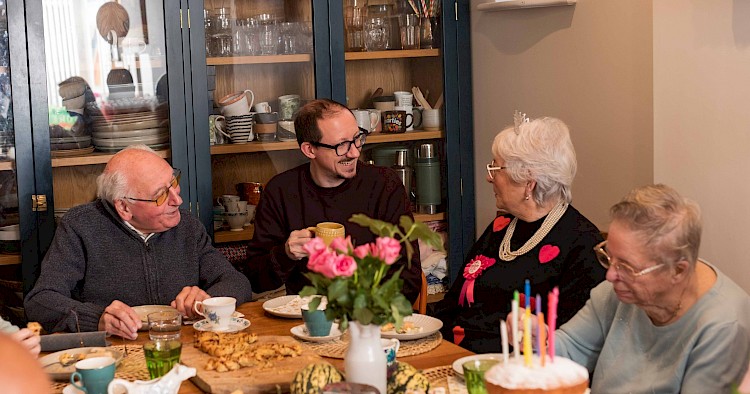Our response to Prof Chris Whitty's annual report
In his latest annual report, ‘Health in an ageing society’, England’s chief medical officer Professor Sir Chris Whitty warns that 'the UK faces an ageing crisis and healthcare must step in.' As people tend to move away from towns and cities in later life, 'the elderly boom will be in rural, largely coastal, areas, and these places are often poor cousins when it comes to provision.'
Professor Whitty’s solutions to the ageing crisis are centred around improvements in the planning and provision of services, environments, and healthcare for older people. The links between health, wellbeing and loneliness are well established, and at Re-engage we know that a greater proportion of our older people living in mainly and largely rural areas report that they often feel left out, isolated from others, and lonely. While two-thirds of the older people we support live with long-term health conditions, this rises to 86% of those living in rural areas, where more of our older people are aged 85 and over.
The report proposes improvements to housing and transport so people can live as independently as possible as they age. According to our latest annual survey, 27% of our older people living in rural areas live in retirement, assisted or some form of extra-care housing, compared to 18% of those living elsewhere. The minority of our older people who are married or living with a partner are twice as likely to live in an urbanised area as in a rural area.
Health and mobility issues combined with a lack of affordable, reliable public transport can make it more difficult for older people living in rural areas to access local events and services. Our annual survey found that in the year to March 2023, fewer of the older people that we support in rural areas had engaged with services provided by other organisations than older people living in more urbanised areas. While our older people in rural areas are just as likely as others to tell us that attending our tea parties has made them feel happier and given them something to look forward to, they are less likely to have become more physically active overall, or to feel strongly that they are part of their local community.
Our dedicated volunteers work hard to reduce loneliness and social isolation amongst those aged 75 and over throughout the UK via accessible tea parties and social gatherings, as well as helping older people to maintain a connected and healthy lifestyle thanks to a growing network of activity groups.
‘I am less lonely and getting out more. I go shopping now and even go to the pub for a pint sometimes. I am 100% better in myself.’ (Activity group participant)
Professor Whitty refers to the importance of ‘social networks’ as a proven model of supporting people to stay connected in later life. Social networks can come in all shapes and sizes; we believe in the importance of accessible connection, so we offer telephone befriending via our call companions services, which can be accessed by all members - including those who may be housebound.
Our services yield positive results, with nine out of 10 older people rating their experience as ‘excellent’ or ‘good’ and reporting that our services have had a positive impact on their lives. No matter where they live or which service they join, more than seven out of 10 older people have made friends after joining Re-engage.
In a recent consultation on what brings our older people joy, 74% of older people mentioned the importance of social connection. Many acknowledged that not everyone has friends or family to lean on, and whilst 43% promoted human interaction as a key source of happiness, only 11% suggested seeing or speaking to family members. Interactions with new people and strangers were also amongst the suggestions made by our older people, including initiating conversations on the bus, joining social groups, and volunteering.
Additionally, more than a third of older people (39%) told us they find joy in nature, either inside or outside of the home. Many shared stories of interactions with wildlife, demonstrating the significant role local environment plays in the health, wellbeing and happiness of older people. Plans to improve the lived environment cannot ignore the impact of the climate crisis. Our most recent research (in partnership with the New Philanthropy Capital) found that people over the age of 75 are disproportionately affected by the climate crisis, mainly because of health issues and the need for emergency planning, particularly for those in low-income households. As Professor Whitty’s report and our own research highlights, improving access to green and blue spaces for those aged 75 and over would offer myriad benefits to physical and mental wellbeing as well as social and community benefits.
Non-profit organisations like Re-engage work hard to tackle the barriers and challenges that increase social isolation and loneliness as we age, but we cannot do it alone. As Professor Whitty recognises, government ministers must acknowledge the ageing crisis at play and put in place holistic policies to prevent and tackle loneliness early on. We are pleased to see the link between housing, environment, service provision and loneliness being recognised in Professor Whitty’s annual report, and we hope to see his recommendations actioned and implemented.
-
View
More news

All about activity
Read how our activity groups offer older people a gateway to movement and companionship.
By Re-engage

Advent of Change 2023
We’re proud to be part of this year’s Advent of Change Christmas campaign. Read more about this important initiative and how you can be involved.
By Re-engage

